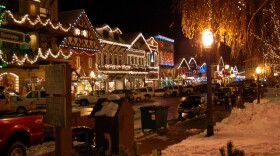All month, we've been following KPLU travel expert Matthew Brumley as he journeys through Europe. Below, you can hear him in the Hungarian capital, Budapest; the Tuscany region of Italy, and the Italian city of Bolgona.
This week, we went back into the archives for one of our favorite episodes of "Going Places." Brumley was in Vienna, standing near a church, getting ready to tape his segment with KPLU's Ed Ronco, back in Seattle.
And then, the bells started:
Vienna, Brumley says, was the Seattle of the 19th century -- an epicenter of music, coffee, and culture.
Music and Coffee
At the center of town is St. Stephen’s, a soaring Gothic cathedral. Mozart was married here. Vivaldi’s funeral took place here, too. Ludwig von Beethoven is purported to have realized the extent of his deafness when he looked up at the St. Stephen’s steeple and noticed birds flying away, but realized he could not hear the bells that frightened them.
KPLU travel expert Matthew Brumley notes that Vienna was also home to Gustav Mahler, Joseph Haydn and Richard Strauss. There are deep classical music roots in this city.
Today, the bells at St. Stephen’s are perhaps the loudest and most noticeable music in Vienna, pealing out over the rooftops from the center of town.
But Vienna’s classical music scene remains rich. The Vienna Philharmonic Orchestra has been playing here for 170 years. And you can visit the Vienna State Opera, whose season runs from October through June.

Brumley calls Vienna “the Seattle of the 19th century,” not only for its music scene but also for its coffee culture. Coffeehouses in Vienna were integral to city life, and still are. For writers of the day, they were places to work and even live. Some used coffeehouses as their primary addresses. For others, they served as living rooms of sorts. People would spend hours there, saving on the need to heat their homes while also interacting with their neighbors.
Their popularity dipped in the middle of the 20th century, but many are still going strong. Brumley says you shouldn’t miss the Café Central.It’s located in the middle of the city (as its name might suggest) and boasts warm light under beautiful gothic arches.
Architecture And War
Austria lost everything in World War I. By 1918, the Austro-Hungarian Empire had broken apart. Vienna was its capital, and it still has an imperial feel, Brumley says.
Austria was annexed by the Nazis during World War II, and it paid the price. The damage leveled in Vienna is evident in its varied architecture.
“When you’re walking down the street, you’ll see one modern building next to a Baroque building, next to a Rococo building, next to a neoclassical building,” Brumley said. “What that shows, and what that reveals is the damage that occurred here during World War II.”
Many still remember seeing the city rebuilt from its smoldering war wounds. Brumley says he was talking to a 93-year-old man who told him about seeing the city leveled.
“He got a little teary when he was telling the story,” Brumley said. “There are still people here today who remember the 1940s and carry that memory with them.”
Vienna Today

Modern Vienna is thriving. More than 1.7 million people live here. It’s where 17th century Europe meets the 21st century, and where east meets west. Brumley says the city is culturally different than its neighbors to the west.
“If you speak to someone in the German world and you say ‘Austria,’ often times they’ll roll their eyes and think that the Austrians are stuck in the time of Mozart,” Brumley said, adding that it goes the other way, too. “The Germans, for the Austrians, are a little bit wacky, a little bit free-thinking.”
--
Matthew Brumley is the founder of Earthbound Expeditions, which organizes group travel to destinations around the world for various clients, including KPLU. "Going Places" is our new travel segment exploring all aspects of getting from Point A to Point B. Have a travel hangup or a tip? Let us know in the comments.







